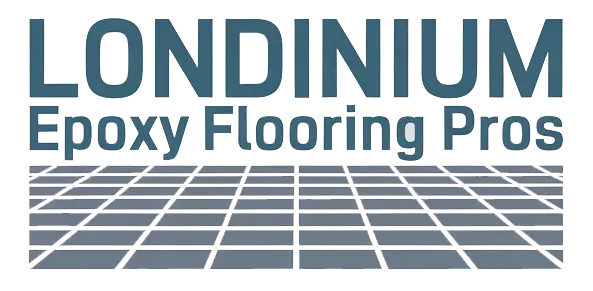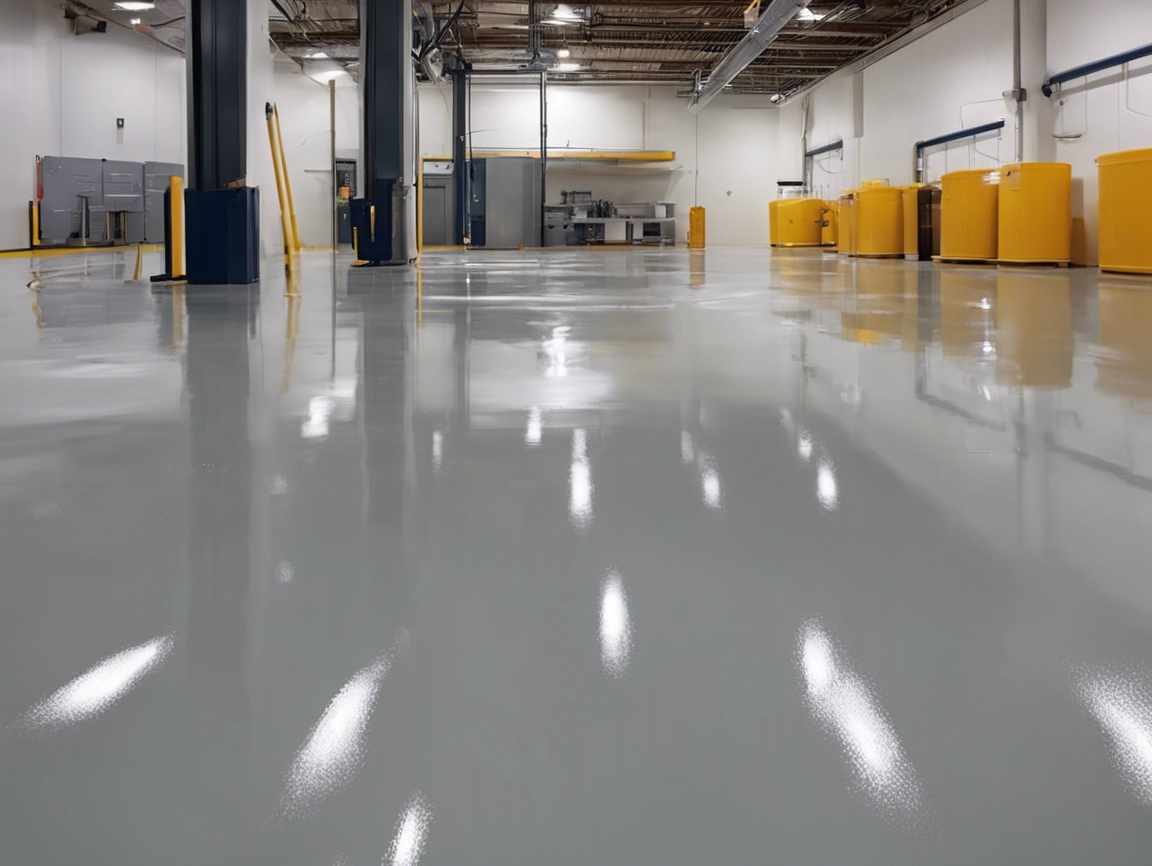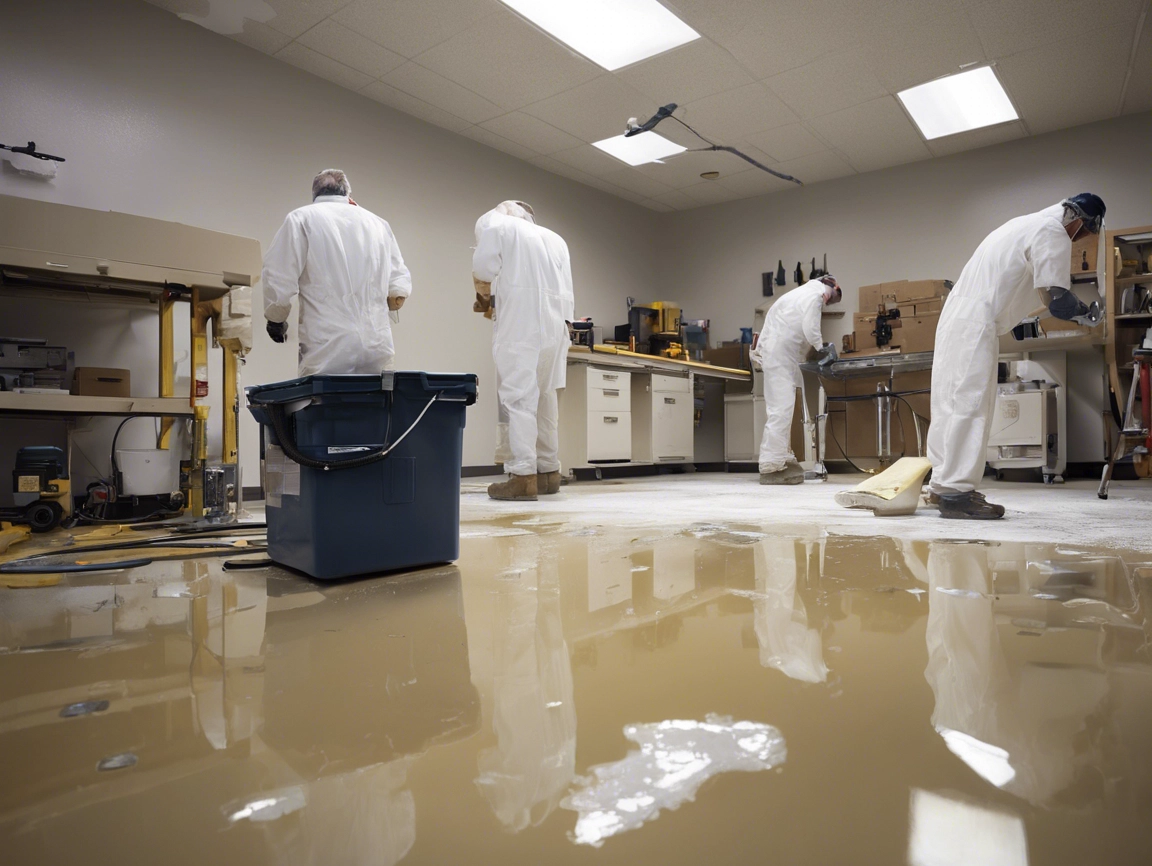Epoxy flooring is revolutionising commercial and industrial spaces across the UK. This innovative flooring solution combines layers of epoxy resin and hardeners to create a robust, seamless surface that’s both functional and aesthetically pleasing.
For businesses facing extreme demands on their floors, commercial epoxy coatings offer an unparalleled solution. They’re stronger than concrete, increasing weight capacity and providing superior protection against chemical spills, acids, and water damage. What’s more, epoxy floors can be installed quickly, minimising downtime for businesses. With options like self-levelling epoxy and epoxy flake flooring, there’s a solution for every commercial need.
Key Takeaways
- Commercial epoxy flooring offers superior durability, chemical resistance, and easy maintenance, making it ideal for high-traffic industrial and commercial spaces.
- Epoxy floors provide excellent safety features, including slip resistance and dust-proofing, whilst offering customisable aesthetics to suit various business needs.
- Industries such as manufacturing, automotive, warehousing, aerospace, food processing, and pharmaceuticals benefit greatly from epoxy flooring’s unique properties.
- The installation process involves meticulous surface preparation, priming, and application techniques to ensure a long-lasting, high-performance floor.
- While initial costs may be higher than traditional flooring options, epoxy flooring offers significant long-term savings and a high return on investment due to its longevity and low maintenance requirements.
What Is Commercial Epoxy Flooring?
Commercial epoxy flooring is a high-performance surface coating system designed for use in industrial and commercial environments. It’s composed of multiple layers of epoxy resin and hardeners, which, when combined, create a robust and seamless surface.
This flooring solution offers superior durability and resistance to heavy foot traffic, machinery, and chemical spills. It’s particularly well-suited for factories, warehouses, hospitals, schools, and other high-traffic commercial spaces.
Key features of commercial epoxy flooring include:
- Strength: Epoxy flooring surpasses concrete in strength, increasing floor weight capacity.
- Chemical resistance: It protects against spills from acids, alkalis, solvents, and other corrosive elements.
- Low maintenance: The seamless, non-porous surface is easy to clean and doesn’t trap debris.
- Customisability: Available in various colours and designs, allowing for brand identity incorporation.
- Safety: Can be formulated with slip-resistant additives to enhance workplace safety.
- Longevity: Properly installed epoxy flooring can last for decades with minimal maintenance.
Commercial epoxy flooring systems come in several variants, including self-levelling epoxy, epoxy flake flooring, and chemical-resistant formulations. These options cater to specific industry needs and aesthetic preferences.
The installation process is relatively quick, minimising business downtime. Once cured, the epoxy creates a cross-linked polymer structure that’s incredibly solid and resistant to various types of damage, making it an ideal choice for demanding commercial environments.
Benefits of Commercial Epoxy Flooring
Commercial epoxy flooring offers numerous advantages for businesses across various industries. Its unique properties make it an ideal choice for high-traffic areas and demanding environments.
Durability and Longevity
Epoxy flooring delivers exceptional durability and longevity in commercial settings. It’s harder wearing than concrete, increasing the floor’s weight capacity and resilience. The curing process transforms epoxy into a solid, cross-linked polymer structure that withstands heavy everyday use without showing signs of damage. This robust nature ensures the flooring serves businesses for many years, making it a cost-effective long-term investment.
Easy Maintenance and Cleaning
The non-porous nature of epoxy flooring simplifies maintenance and cleaning processes. It doesn’t collect soils or moisture, preventing the build-up of bacteria and eliminating harsh odours. The seamless surface is easy to clean, offering excellent hygiene standards crucial for commercial environments such as kitchens and hospitals. Its resistance to harsh cleaning chemicals further enhances its low-maintenance qualities, saving time and resources on floor care.
Safety Features
Epoxy flooring incorporates several safety features beneficial for commercial spaces:
- Slip resistance: With the addition of quartz aggregates, epoxy floors provide excellent traction, reducing slip hazards in high-traffic areas.
- Chemical resistance: The flooring withstands spills of oils, fats, grease, and harsh chemicals without compromising its integrity.
- Heat resistance: Epoxy coating doesn’t melt or deform under hot temperatures, making it suitable for commercial kitchens and industrial environments.
- Dust-proof: The sealed surface prevents dust accumulation, contributing to a cleaner, healthier workspace.
- Colour options: A wide range of epoxy paint colours allows businesses to create custom designs that align with their brand or interior decor.
- Seamless appearance: The coating provides a smooth, uniform surface that enhances the overall look of commercial spaces.
- Highly attractive finish: Epoxy floors offer a glossy, professional appearance that impresses clients and customers.
- Customisation: Various finishes, including self-levelling epoxy and epoxy flake flooring, cater to diverse commercial needs and preferences.
Industries That Benefit from Epoxy Flooring
Manufacturing Facilities
Manufacturing facilities gain significant advantages from epoxy flooring. The heavy-duty nature of epoxy withstands the rigours of constant foot traffic, heavy machinery, and potential chemical spills. Its durability ensures minimal disruption to operations, reducing maintenance costs and downtime. In high-tech test labs and automated assembly areas, conductive epoxy floors provide essential static control. The seamless surface of epoxy flooring also facilitates easy cleaning, maintaining a hygienic environment crucial for quality control.
Automotive Workshops
Automotive workshops benefit immensely from epoxy flooring. The chemical-resistant properties protect against oil, grease, and other automotive fluids that could damage conventional flooring. Epoxy’s high compressive strength supports heavy vehicles and equipment without cracking or chipping. The smooth, seamless surface allows for easy movement of vehicles and tools, improving workflow efficiency. Additionally, the reflective properties of epoxy flooring enhance lighting, creating a brighter, safer work environment.
Warehouses and Distribution Centres
Epoxy flooring is ideal for warehouses and distribution centres. Its ability to withstand heavy loads from forklifts and pallet jacks prevents floor damage and extends the lifespan of the surface. The seamless nature of epoxy flooring eliminates joints and cracks where dirt can accumulate, simplifying cleaning processes. Line markings and colour coding can be easily incorporated into epoxy flooring, enhancing organisation and safety in these high-traffic environments.
Aerospace Facilities
The aerospace industry relies heavily on epoxy flooring for its exceptional chemical resistance and durability. In areas dedicated to aircraft maintenance, missile assembly, and rocket production, epoxy floors withstand the harsh chemicals used in these processes. The seamless nature of epoxy flooring prevents dust accumulation, crucial for maintaining clean environments in sensitive aerospace manufacturing and testing areas. ESD formulations of epoxy flooring provide necessary static control in electronics assembly zones.
Food and Beverage Processing Plants
Food and beverage processing plants benefit from the hygienic properties of epoxy flooring. The non-porous surface prevents bacterial growth and resists staining from food spills. Epoxy’s resistance to acids, alkalis, and other chemicals used in cleaning processes ensures long-lasting performance in these demanding environments. The slip-resistant options available with epoxy flooring enhance safety for workers in potentially wet areas, reducing the risk of accidents.
Pharmaceutical Laboratories
Pharmaceutical laboratories require sterile, easy-to-clean environments, making epoxy flooring an excellent choice. The seamless, non-porous surface prevents contamination and facilitates thorough cleaning and disinfection. Epoxy’s chemical resistance protects against spills of harsh substances commonly used in pharmaceutical research and production. The ability to incorporate anti-microbial additives into epoxy flooring further enhances its suitability for these sensitive environments.
Types of Commercial Epoxy Flooring
Commercial epoxy flooring offers a variety of options to suit different business needs and aesthetic preferences. These types range from simple, solid colours to more complex, decorative finishes.
Plain Colour Epoxy Coating
Plain colour epoxy coating provides a sleek, uniform appearance ideal for industrial and commercial spaces. This type of epoxy flooring offers a smooth, glossy finish in a wide range of colours, allowing businesses to match their brand aesthetics or create visually appealing environments. Plain colour epoxy is easy to clean, highly durable, and resistant to chemicals, making it suitable for factories, warehouses, and retail spaces.
Metallic Epoxy Flooring
Metallic epoxy flooring creates a stunning, three-dimensional effect that mimics the appearance of polished metal or marble. This type of flooring combines epoxy resin with metallic pigments to produce a unique, swirling pattern that adds depth and visual interest to commercial spaces. Metallic epoxy is particularly popular in high-end retail stores, showrooms, and hospitality venues where a luxurious, eye-catching floor is desired.
Epoxy Flake Systems
Epoxy flake systems, also known as epoxy chip flooring, incorporate coloured vinyl flakes into the epoxy resin. This type of flooring offers a textured, multi-coloured finish that is both decorative and functional. The flakes provide additional slip resistance, making it an excellent choice for areas prone to spills or moisture. Epoxy flake systems are commonly used in garages, commercial kitchens, and industrial facilities where safety and aesthetics are equally important.
Installation Process
The installation of commercial epoxy flooring requires meticulous attention to detail and expert application techniques. This multi-step process ensures a durable, long-lasting finish that meets the demanding requirements of commercial environments.
Surface Preparation
Surface preparation is crucial for the successful installation of epoxy flooring. The concrete substrate must be clean, dry, and free from contaminants. Technicians use diamond grinding or shot blasting to remove surface imperfections and create a profile that allows the epoxy to bond effectively. Any cracks or joints are repaired using epoxy fillers to ensure a seamless finish. Moisture testing is conducted to verify that the substrate’s moisture content is within acceptable limits, preventing future issues such as delamination or bubbling.
Priming and Filling
Once the surface is prepared, a primer coat is applied to enhance adhesion and seal the concrete. This step is essential for preventing air bubbles and improving the overall durability of the epoxy system. For uneven surfaces, a self-levelling compound may be used to create a smooth base. Any remaining imperfections are filled with epoxy putty to achieve a perfectly level surface. The primer coat is allowed to cure for the manufacturer-specified time before proceeding to the next stage.
Application Techniques
The main epoxy coating is applied using specialised techniques to ensure even coverage and optimal performance. Roller application is common for smooth surfaces, while squeegees are used for self-levelling epoxy systems. Multiple layers may be applied, with each coat allowed to cure partially before the next is added. For decorative finishes, such as metallic epoxy or flake systems, specific application methods are employed to create the desired effect. The final topcoat is often applied using a high-quality roller to achieve a smooth, glossy finish. Curing times vary depending on the epoxy formulation and environmental conditions, typically ranging from 24 to 72 hours before light foot traffic is permitted.
Maintenance and Care
Commercial epoxy flooring requires minimal maintenance, making it an ideal choice for busy commercial environments. Regular cleaning and proper care ensure the longevity and performance of epoxy floors.
Daily Cleaning
Daily maintenance of epoxy floors involves:
- Sweeping or dust mopping to remove loose dirt and debris
- Damp mopping with a pH-neutral cleaner for stubborn stains
- Immediate clean-up of spills to prevent potential staining
Deep Cleaning
Periodic deep cleaning enhances the appearance and hygiene of epoxy floors:
- Use an auto-scrubber with soft brushes or pads for large areas
- Apply a specialised epoxy floor cleaner for thorough dirt removal
- Rinse thoroughly with clean water to avoid residue build-up
Preventative Measures
Implementing preventative measures prolongs the life of epoxy flooring:
- Install entrance mats to reduce dirt and grit tracked onto the floor
- Use protective pads under heavy equipment to prevent scratches
- Avoid dragging heavy objects across the surface
Addressing Damage
Minor damage to epoxy flooring can be addressed promptly:
- Repair small chips or cracks with epoxy patching compound
- Sand and recoat localised areas of wear or discolouration
- Consult professionals for extensive damage or recoating needs
Long-Term Care
Long-term care strategies maintain the quality of epoxy flooring:
- Schedule professional inspections every 2-3 years
- Reapply a clear topcoat every 5-10 years, depending on wear
- Consider full recoating after 10-20 years of heavy use
By following these maintenance guidelines, commercial epoxy flooring remains durable, attractive, and functional for decades, maximising the return on investment for businesses across various industries.
Cost Considerations
Commercial epoxy flooring offers a cost-effective solution for businesses seeking durable and long-lasting flooring options. The initial investment in epoxy flooring often outweighs traditional alternatives when considering its longevity and reduced maintenance costs.
Initial Investment
The upfront cost of commercial epoxy flooring varies based on several factors:
- Square footage of the area
- Condition of the existing substrate
- Complexity of the design
- Type of epoxy system chosen
On average, commercial epoxy flooring costs £30 to £100 per square metre, including materials and professional installation. High-end options, such as metallic epoxy or custom designs, may range from £100 to £150 per square metre.
Long-Term Savings
Despite the higher initial investment, epoxy flooring provides significant long-term savings:
- Durability: Lasts 10-20 years with proper maintenance
- Low maintenance: Requires minimal upkeep, reducing cleaning costs
- Energy efficiency: Reflective properties can lower lighting costs
- Reduced replacement frequency: Outlasts traditional flooring options
Return on Investment
Businesses benefit from a high return on investment (ROI) with commercial epoxy flooring:
| Benefit | Impact on ROI |
|---|---|
| Increased productivity | Smooth surface improves equipment mobility |
| Enhanced safety | Reduces workplace accidents and liability costs |
| Improved aesthetics | Attracts customers and boosts brand image |
| Chemical resistance | Minimises damage-related expenses |
Maintenance Costs
Epoxy flooring’s low maintenance requirements contribute to its cost-effectiveness:
- Daily cleaning: Simple sweeping and damp mopping suffice
- Specialised equipment: No need for expensive cleaning machines
- Repairs: Minor damages easily fixed with patching compounds
- Resealing: Topcoat reapplication every 5-7 years maintains appearance
Comparison to Alternative Flooring
When compared to other commercial flooring options, epoxy offers competitive advantages:
| Flooring Type | Lifespan | Initial Cost | Maintenance Cost |
|---|---|---|---|
| Epoxy | 10-20 years | Moderate | Low |
| Concrete | 5-10 years | Low | Moderate |
| Vinyl | 5-15 years | Low-Moderate | Moderate |
| Carpet | 3-5 years | Low | High |
By considering these cost factors, businesses can make informed decisions about implementing commercial epoxy flooring, ensuring a balance between initial investment and long-term value.
Conclusion
Commercial epoxy flooring stands as a superior choice for businesses across the UK. Its unparalleled durability longevity and versatility make it an ideal solution for diverse industries. From enhancing safety and efficiency to providing aesthetic appeal epoxy flooring offers a multitude of benefits. While the initial investment may seem substantial the long-term cost-effectiveness and minimal maintenance requirements make it a wise choice. As more companies recognise its advantages epoxy flooring continues to transform commercial spaces delivering lasting value and performance.
Frequently Asked Questions
What is commercial epoxy flooring?
Commercial epoxy flooring is a high-performance surface coating system designed for industrial and commercial environments. It’s characterised by superior durability, resistance to heavy foot traffic, and protection against chemical spills. This makes it ideal for factories, warehouses, hospitals, and schools. Key features include strength, chemical resistance, low maintenance, customisability, safety enhancements, and longevity.
How durable is epoxy flooring compared to concrete?
Epoxy flooring surpasses concrete in strength and durability. It enhances weight capacity and offers excellent protection against chemical spills, acids, and water damage. The solid, cross-linked polymer structure withstands various types of damage, making it an optimal choice for demanding commercial settings. With proper maintenance, epoxy flooring can last 10-20 years, significantly longer than traditional concrete floors.
What industries benefit most from epoxy flooring?
Epoxy flooring benefits numerous industries, including manufacturing, automotive workshops, warehouses, distribution centres, aerospace facilities, food and beverage processing plants, and pharmaceutical laboratories. It’s particularly advantageous in environments requiring high durability, chemical resistance, easy cleaning, and safety features. The versatility of epoxy flooring makes it an essential solution across multiple sectors, enhancing safety, efficiency, and cleanliness.
What types of commercial epoxy flooring are available?
Several types of commercial epoxy flooring are available to suit various business needs and aesthetic preferences. These include plain colour epoxy coatings for a sleek, uniform appearance; metallic epoxy flooring for a luxurious, three-dimensional effect; and epoxy flake systems incorporating coloured vinyl flakes for added slip resistance. Each type offers unique benefits, making epoxy a versatile choice for diverse commercial applications.
How is commercial epoxy flooring installed?
The installation of commercial epoxy flooring involves a meticulous process requiring expert application techniques. It begins with thorough surface preparation, including cleaning, drying, and repairing the concrete substrate. A primer coat is applied to enhance adhesion, followed by the main epoxy coating. Specialised techniques ensure even coverage. Curing times typically range from 24 to 72 hours before light foot traffic is permitted. This is unless epoxy tiles are being used as an alternative option with quicker installation times.
How should commercial epoxy flooring be maintained?
Commercial epoxy flooring requires minimal upkeep. Daily cleaning involves sweeping and damp mopping with a pH-neutral cleaner. Immediate spill clean-up is essential. Periodic deep cleaning using auto-scrubbers and specialised cleaners is recommended. Preventative measures, such as entrance mats and protective pads, can prolong the flooring’s life. Minor damages can be repaired with epoxy patching compounds. Professional inspections and reapplication of a clear topcoat ensure long-term durability.
How cost-effective is commercial epoxy flooring?
While the initial investment for commercial epoxy flooring can range from £30 to £150 per square metre, it proves cost-effective in the long run. Its longevity (10-20 years), minimal maintenance requirements, and potential energy savings due to reflective properties contribute to significant long-term savings. The return on investment is further enhanced by increased productivity, improved safety, and reduced maintenance costs compared to alternative flooring options.


